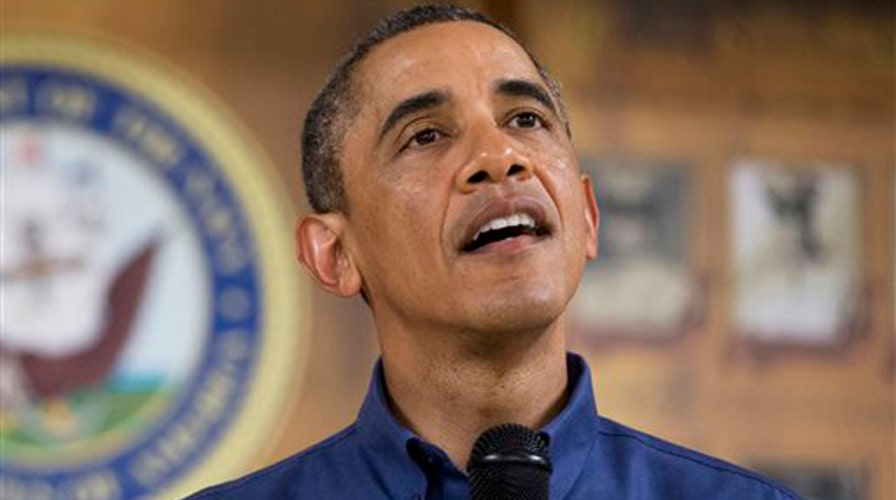Obama and the art of his escape from ObamaCare
How the president has defied his own law and keeps trying to flee the consequences of the Affordable Care Act
This is a rush transcript from "On the Record," December 26, 2013. This copy may not be in its final form and may be updated.
DANA PERINO, FOX NEWS GUEST HOST: Is President Obama trying to make a great escape from his own health care law? Our next says the president is constantly on the run.
"National Review" editor, Rich Lowry, joins us. Rich, I enjoyed your column today. You say that the president is basically just one step ahead of his own health care law, basically.
RICH LOWRY, EDITOR, NATIONAL REVIEW: Yeah, Dana, first of all, Merry Christmas, Happy New Year.
PERINO: Thank you.
LOWRY: I think it's so extraordinary because you can understand a president trying to evade provisions or delay provisions of the law he opposed or that was passed, you know, the prior administration. But this is a law that he staked everything on, that Democrats lost the House of Congress on. And all year, basically, it's been a story of waivers and delays and reinterpretations to avoid the political pain of the worst of this law.
PERINO: You write in your column today, that "This is not just government by dictate, it is government by embarrass dictate." What do you mean by that?
LOWRY: Well, I don't need to tell you, Dana. If an administration is making an announcement at 9:00 p.m. at night, by definition, that is not a good announcement. There have been key things that they have announced at night. This partial suspension of the individual mandated for people who are cancelled and find the ObamaCare policies too expensive to buy, that was announced at 9:00 p.m. That was a huge deal. And there are other changes they have basically have made no effort to broadcast whatsoever. So, this is no way to run a railroad.
PERINO: That's an interesting point because, in some ways, it maybe helps protect them politically for from some bad headlines, I talked to some people this week. A young woman I talk to at the park every day. She was so confused by what the state of the law was. Maybe they actually are one of the reasons they are possibly seeing declining poll numbers because people are confused and, therefore, they think there is a tremendous amount of incompetence going on when it comes to the ObamaCare law.
LOWRY: Yeah, it's added to the sense of chaos here. You are exactly right. But every single day the imperative has been just to get beyond the latest problem. And initially, it's the employer mandate was going to be big problem. So they delay that a year. Then it was all these cancellations, so you have the president announcing a fix that turns out mostly to be bogus. And then you have all the people who have cancellations because the fix didn't work, and for them, you are suspending the individual mandate. I think a big debate in the year coming up will be over the individual mandate, which will probably now be politically unsustainable. You can't suspend it for part of the population and then arbitrarily apply it to the rest of the people. And red state Democrats are obviously very nervous about it. And this is the single most unpopular part of a very unpopular law.
PERINO: Someone that you and I both know, Yuval Levin, wrote last week for "National Review" that one of the things he read into the announcement about the fine being alleviated for individuals who had lost their health insurance plans and couldn't get them before January 1st, he thinks that there might be some more knowledge within the administration about what is happening in terms of enrollment and that they are trying to set themselves up for possibly the unraveling of the individual mandate without any help from Congress.
LOWRY: The point Yuval was making in that post is that all of this has been a black box. The administration is being as secretive as possible about all this. So you never really know what they are thinking or what's underneath the rock. Only they know. But, the way they have been acting and these various delays suggest there's something very ugly under that rock. Now, they may have gotten a wave of sign up right here at the end, but it's -- you still don't know whether the population is going to be big enough to make the issue polls work, whether they're going to have the right kind of people and the right demographics for them to work. And certainly, if you look at the numbers state by state, it suggests there's certain states where this law is going to be stillborn because you're not just going to have enough people in the state level insurance pool to make it work.
PERINO: What recourse -- aside from the midterm elections turnout, what recourse do Americans have maybe through their representatives in Congress, if they are concerned about the executive branch making decisions without consulting or even telling Congress in advance that they are changing key parts of the law as they try to roll it out?
LOWRY: Yeah. That's a huge issue. Because it's so perverse, where the president seems to oppose changes being done lawfully by Congress. Right? When Congress offers to codify certain changes he's made, he opposes it. I don't think Republicans have a good answer really about what to do about the lawlessness. And ultimately, the answer is a big wave come next November. That will be the biggest message from the American people if there is a wave of revolt in the country that you see in the House and Senate races.
PERINO: All right, Rich, thank you so much.
LOWRY: Thanks, Dana.

